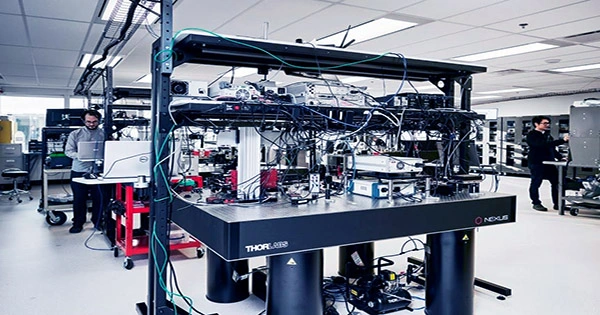Researchers at Xanadu in Toronto have completely smashed the existing fastest computers and methods in solving a difficult sampling issue using a photonic quantum computer device. It would take supercomputers and algorithms roughly 9,000 years to compute, according to their study in Nature, but their quantum processor Borealis ripped through it in only 36 microseconds. This decade is shaping up to be the quantum computing era. A growing number of chips and solutions are demonstrating that they can do jobs quicker than traditional computers, and even tackle problems that are completely beyond the capabilities of present machines. Gaussian boson sampling is one such job (GBS).
Boson sampling is a task that requires the computer to create a sample from the probability distribution of single-photon observations at the circuit’s output — if that sounds like nonsense, you’re right; even our fastest supercomputers struggle to comprehend it. BGS has become a standard benchmark for calculating how much quicker a quantum processor is than its regular equivalent due to a few features in BGS that make it non-discriminatory towards particular quantum configurations.
Quantum computers are more powerful than ordinary computers because they can handle three units of data instead of two. Rather than binary (0 being “off” and 1 being “on”), quantum computers employ qubits (0, 1 and “both”).They are substantially quicker than existing computers because they compute the likelihood of each answer before utilizing it, giving them an edge over machines that must run through each solution to determine if it is true or false.
To transfer quantum information, Xanadu’s photonics quantum processor, Borealis, employs successive bursts of light. It’s a monster of a chip, with up to 219 qubits, of which 129 were used in this study. Photon-based quantum devices, according to the experts, are the most probable architecture to be used in the future since they are often more scalable than other options. The Borealis chip is unique in that each quantum gate can be programmed, and while other chips have attempted to emulate this feature, none have yet achieved attain quantum supremacy (outperforming traditional computers).
This achievement, according to the experts, represents a major step forward in the development of quantum processors. “This study marks a watershed moment on the road to a viable quantum computer,” the scientists write, “validating important technical properties of photonics as a platform for this objective.”
While all of this is really exciting, quantum computers still have a long way to go. GBS has no practical uses, and quantum chips in their current state are difficult to find a purpose for. The Ministry of Defence in the United Kingdom recently acquired its first quantum computer for testing, although it will likely be several years before such computers are widely used.
















